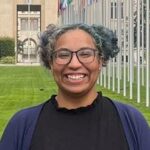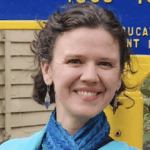I have always loved the story of love and dedication between RuthThe great-grandmother of David. More and NaomiThe mother-in-law of Ruth. More. As an adult, this passage has taught me about the power of chosen family, loyalty, and lineage. Ruth was so important to me as a child that I wrote a dramatic scene from the story in fifth grade. As I reread the book, I thought about my country’s battle with how to treat the “foreigner” and the stranger. I found clear lessons in a time when a reminder is needed on the treatment of God’s children, regardless of nationality. I was reminded of Boaz’s role, not as Ruth’s husband, but for his actions when he learned of the poor, foreign-born Moabite in Bethlehem.
Family in flux
The book of Ruth starts with a famine and a family moving to Moab: a husband and wife with two sons and their wives. When the men die, leaving three widows, Naomi, the mother-in-law, urges her two daughters to leave for their benefit, saying,
“No, my daughters, it grieves me very much for your sakes that the hand of the LORD has gone out against me.”
This lament prompts Ruth’s promise to Naomi. When she says “Let your God be my God,” she means the same God that Naomi believes has gone against her. When she says, “May the Lord punish me ever so severely…” it is amid perceived punishment. These are not hypothetical; Ruth is committing to Naomi amid difficulty against her own best interest.
Ruth commits to staying with Naomi and follows her to Bethlehem. Naomi sends her to glean grain in Boaz’s fields. BoazHusband of Ruth and great-grandfather of David. More, described as a man of noble character, notices Ruth gleaningGleaning is the act of collecting leftover crops from farmers' fields after they have been harvested. In some ancient cultures, like Israel, gleaning was a form of welfare. The book of Ruth contains an account of gleaning in which Ruth met her future husband, Boaz. More in his fields. Before reacting, he asks his staff about her. After learning the context, he instructs them to leave enough grain for her to gather and not to ridicule her, then introduces himself and invites her to dinner.
Boaz today
Rereading this response made me look for the Boazes in my community today. His reply to finding a strange woman gathering food from his fields was to tell his staff to ensure she had enough to take and to say hello. He asked questions and learned about her situation before deciding how to proceed. He was generous but tried to ensure Ruth could maintain her dignity. Boaz engaged with her directly. He took her need upon himself by telling her not to go to another field to glean but to continue to come to his. Then, he ensured her long-term security by marrying her. This felt striking in light of the treatment and rhetoric about immigrants in my country today.
Boaz learns about his cultural responsibility as a kinsman-redeemer of Ruth. After obtaining permissions, he marries her, and she has a child, Obed, who fathers Jesse, who in turn fathers DavidSecond king of Israel, David united the northern and southern kingdoms. More.
Ruth’s loyalty and Boaz’s honor created the union that brought us King David. After Obed’s birth, Naomi exclaims, “For your daughter-in-law, who loves you and is better to you than seven sons, has given him birth.”
The sum of Ruth’s choices resulted in her standing outshining even that of Naomi’s seven sons, as they led to her bearing offspring. When Naomi told Ruth to leave, she stayed and committed to being by Naomi’s side through hard times. When she directed Ruth, she listened. Ruth took a risk and was vulnerable and open with her need and did not abandon her mother-in-law, even when doing so may have been in her best interest. Likewise, Boaz was gracious and giving; before knowing who she was and his responsibility to her, he cared for her well-being. He honored his family and tradition in taking her as his wife.
This story of complex relationships teaches us about responsibility, love, treating others well, and caring for those around us. Ruth’s tale stands alone as a lesson, regardless of the lineage she is a part of.
What will be our legacy?
JesusJesus is the Messiah whose life, death, and resurrection are God's saving act for humanity. More tells us lineage matters. In MatthewA tax collector who became one of Jesus' 12 disciples. More, we read, “Every good tree bringeth forth good fruit; but a corrupt tree bringeth forth evil fruit.” We see this in David and Jesus’ lineage. People discuss Ruth and Boaz as being rewarded by being in the lineage of David and Jesus. I see their legacy as a foundation of love and commitment for both men. David would fiercely love his companion, JonathanSon of King Saul and friend of David. More. After Jonathan’s death, he commits to care for his son and restore his forefather’s land. Jesus would tell us to respond like Boaz, commanding us to do unto others as we’d have them do unto us and to love the stranger.
Considering lineage, Ruth’s story highlights the power and impact of women, grandmothers, or chosen family, on future generations. It wasn’t just her loyalty “exalting” her in the lineage of great men, but that her loyalty helped create men who’d do great things. Today, I recognize that great people, of any gender, are products of those around them, who made and influenced them, and whose spirits and countenance they inherited.
The idea of lineage and legacy troubles me in 2025, though it was a blessingBlessing is the asking for or the giving of God's favor. Isaac was tricked into blessing Jacob instead of his firstborn Esau. At the Last Supper Jesus offered a blessing over bread and wine. To be blessed is to be favored by God. More for Ruth and Boaz. If love, salvationSalvation can mean saved from something (deliverance) or for something (redemption). Paul preached that salvation comes through the death of Christ on the cross which redeemed sinners from death and for a grace-filled life. More, and dedication are their legacies, what will be ours for the future?
- What will be the legacy of those who learn from us?
- Will they be slow to act and considerate of others?
- Or reactionary and self-focused?
- Will we open our homes, hearts, and resources, or cling to ideas of how supporting others doesn’t benefit us?
Ruth’s story demonstrates a challenge to care. A challenge Jesus would preach later. This care emphasizes loving your neighbor and treating others as you’d like to be treated, and posits that how we treat the “least” among us will be reflected back to us. Reexamining Ruth allowed me to reconsider these lessons into adulthood and how I have and have not honored that challenge. How do the fruits of my actions show up in my relationships with friends, or with strangers? Do I leave “handfuls on purpose” to support those I do not know? Do I think about the lineage I’ve stepped into and the legacy I’ll leave with my actions? This scripture also lets me reimagine what this world could be if we take up the challenge in Ruth and intimately tie ourselves to others, if we could walk in the commitment that “your people will be my people” and live with the understanding that all people are God’s people.







